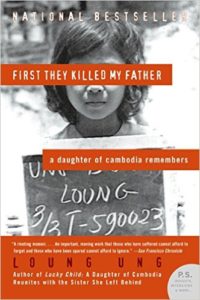Non-fiction
HarperCollins
2000
 I didn’t much like being in Cambodia the first time I went there in early 2014. Led by the most unbearable tour guide imaginable* in a small group made up mostly of middle-aged Australian couples with whom the only thing I had in common was a nationality, I experienced what in retrospect was most likely culture shock. And for a time I wondered if it was because of the effects of the Khmer Rouge genocide on the country. Such a savage and profound event leaves scars on people who endure it, and on the nation itself.
I didn’t much like being in Cambodia the first time I went there in early 2014. Led by the most unbearable tour guide imaginable* in a small group made up mostly of middle-aged Australian couples with whom the only thing I had in common was a nationality, I experienced what in retrospect was most likely culture shock. And for a time I wondered if it was because of the effects of the Khmer Rouge genocide on the country. Such a savage and profound event leaves scars on people who endure it, and on the nation itself.
Nonetheless, even though my mother gave me First They Killed My Father to read before we left on this trip, I resisted it. I didn’t want to read misery porn, which any biography about the Khmer Rouge must surely be. It took these last few years for me to finally work up to reading it. Along with a little assistance from a Dateline special and Sue Perkins travelling along the Mekong.
First They Killed My Father is the biography of Loung Ung from when she is five years old to about ten. Starting in Phnom Penh in 1975, it follows her and her family as the Khmer Rouge first take over and then destroy Cambodia, and make a solid attempt at destroying most of its people. Because of their education and Chinese ethnicity, the family is forced into hiding. First they attempt to remain together with rural relatives, but as the months pass and the Khmer Rouge regime grows ever more frenzied, they are gradually split apart. Loung herself eventually finds herself at a child labour camp, where she endures attempts at brainwashing and training as a child soldier to fight against the Vietnamese.
This memoir is a heartbreaking but necessary look into what life actually constituted in the Khmer Rouge’s regime. Loung and her family struggle with being forced from their privileged city lifestyle and into rural poverty within a matter of days. The Khmer Rouge’s brutal policies divided former city-dwellers from born farmers and were directly targeted at eradicating them through long work and starvation. Over the four years the Khmer Rouge held power, an estimated 2-3 million Cambodians died from execution, starvation, disease and overwork. Through Loung we see more than these stark sentences and follow her experiences.
Loung herself is at first a spoiled, petulant five-year-old who is forced to grow into a forceful and hard young woman. In writing, she reveals several deep, personal shames, mostly involving the theft of food, and does not shy away from her own personality flaws. Her family, given she was so young when they were separated, are strongly written and its various losses are described with affecting grief and nuance. The writing, though often simple, is very affective and immersive, though fortunately not all the time.
A brief book, First They Killed my Father does not linger over the details either. This is a good thing, because the points it makes should not need labouring over. It is also understandable, given Loung will have had to relive her childhood in writing about it. It is to her credit that she has been able to create such a coherent and poignant memoir.
Seeing the killing fields, seeing S-21, does not (thank god) even touch on the trauma of actually living through anything that happened there. Nor does reading a survivor memoir. But it is important to remember the Khmer Rouge genocide; as important as any other horror we as a people inflict on ourselves. We must acknowledge that part of our nature in order to challenge it. There must always be a hope that next time, and next time, and next time, we will stop it.
* He spent every journey anywhere talking constantly, and talking shit. Repetitive shit. With a microphone for no discernable reason. When my mother became ill and had to stay in the hotel on the day scheduled for the Angkor Wat tour, he gave her a permission form to fill out, even though ostensibly participation in anything was voluntary. Upon arrival at Angkor Wat, terrified by the thought of walking through such a serene place in his company, I immediately fled and consciously avoided him the entire time. As a consequence, I still don’t know all that much about Angkor Wat and what everything means inside it, but I had a good time climbing things.

